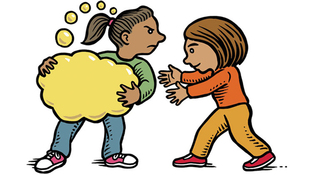 loading
loading
FindingsWhose idea was that, anyway?By six, a majority of kids know their idea when they see it.  Gregory NemecView full imageSomewhere between infancy and intellectual property disputes, we develop the notion that we own the ideas we generate. “Saying that you can own something that people can’t see, like an idea, is a pretty weird and seemingly adult concept,” says social psychologist Kristina R. Olson. “Yet our research shows that six-year-old children actually get it.” In a series of experiments Olson oversaw at Yale, Vivian Li ’15PhD and Alex Shaw ’13PhD interviewed some 60 children, half of them four years old and half six years old. (The work appeared in the April issue of Cognition. Since the study, Olson has moved to the University of Washington.) They asked each child to create two pictures. For one, the child came up with the idea and told an adult how to do the work; for the other, the roles were reversed. When asked which picture they’d like to take home, almost seven out of ten kids, regardless of age, went with the art representing their idea. The kids were also asked to decide on hypothetical pictures created by others: who should take home a picture, the child who generated the idea or the child who made the drawing? The four-year-olds were evenly split; the six-year-olds, by nine to one, picked the idea person. “We don’t yet know what changes developmentally between four and six, and we’re just starting to examine this concept across different cultures,” says Olson. She avoids saying which age group has it right.
The comment period has expired.
|
|